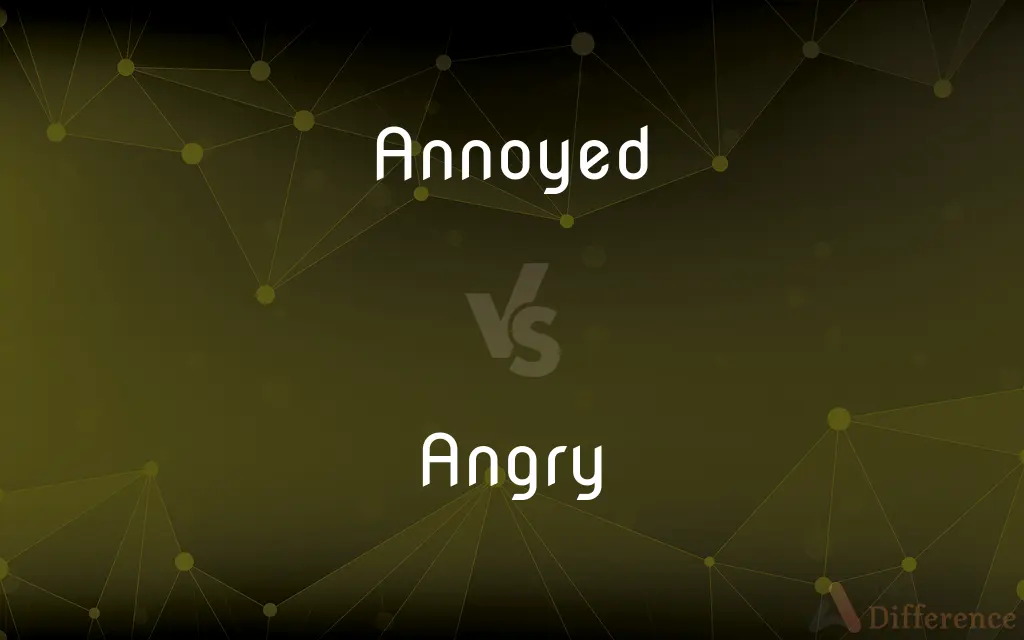Annoyed vs. Angry — What's the Difference?
By Tayyaba Rehman & Urooj Arif — Updated on March 22, 2024
Annoyed refers to a mild irritation or frustration, while angry denotes a stronger, more intense feeling of displeasure or hostility.

Difference Between Annoyed and Angry
Table of Contents
ADVERTISEMENT
Key Differences
Being annoyed is an emotional state characterized by mild irritation or frustration, often resulting from minor inconveniences or nuisances. It's a fleeting feeling that can arise from situations like waiting in a long line or hearing a repetitive noise. Annoyance is typically short-lived and less intense, not significantly impacting one's mood or actions in a profound way. On the other hand, anger is a more intense emotional response, marked by strong displeasure or hostility towards someone or something. Anger can stem from feelings of injustice, hurt, or frustration, and it often demands more cognitive and emotional resources to manage. While annoyance can usually be brushed off or ignored, anger might lead to a desire to address or confront the source of the feeling.
The transition from being annoyed to angry can occur if an irritating situation persists or escalates, highlighting the fluidity between these emotional states. However, the way individuals react to annoyance and anger can vary significantly, influenced by personal tolerance levels, coping mechanisms, and the context of the situation. Annoyance might cause a person to become mildly irritable or complain, whereas anger can lead to more assertive actions, such as confronting the source of displeasure or seeking ways to change the situation.
In interpersonal relationships, expressing annoyance is generally perceived as less serious and is more easily resolved than expressing anger. Annoyed reactions might involve eye-rolling or sighing, while anger can result in raised voices, arguments, or even withdrawal from interaction. Understanding and distinguishing between these feelings can help in managing reactions and communicating emotions more effectively.
Culturally and linguistically, the expressions of annoyance and anger are context-dependent, with various thresholds for what triggers these emotions and how they are socially acceptable to express. The recognition of these differences is essential for navigating social interactions and maintaining healthy relationships. While both annoyance and anger are natural emotional responses, their management and expression play crucial roles in emotional health and interpersonal dynamics.
Comparison Chart
Intensity
Mild irritation or frustration
Strong displeasure or hostility
ADVERTISEMENT
Cause
Minor inconveniences or nuisances
Perceived injustices or significant frustrations
Duration
Typically short-lived
Can be long-lasting
Reaction
Mild irritation, complaining
Assertive actions, confrontation
Impact on Relationships
Generally less serious, easily resolved
May lead to serious conflicts or need for resolution
Compare with Definitions
Annoyed
Expressing frustration in a light manner.
He became annoyed when the meeting was postponed again.
Angry
Showing strong emotional reaction to hurt.
Betrayal by a friend left her feeling deeply angry.
Annoyed
A transient state of discomfort.
The loud music from next door left her feeling annoyed.
Angry
Experiencing intense displeasure.
She was angry about the unfair treatment at work.
Annoyed
Reacting to minor nuisances.
Getting stuck in traffic made him annoyed.
Angry
Demand for change or action due to injustice.
The community was angry about the proposed changes.
Annoyed
Tolerance threshold being slightly exceeded.
Her endless questions about the movie annoyed him.
Angry
Responding with hostility to a situation.
He became angry when confronted with lies.
Annoyed
Feeling mildly irritated by a small inconvenience.
She was annoyed by the constant dripping of the faucet.
Angry
Seeking to address or rectify a wrong.
Their unjust policy made many customers angry.
Annoyed
To cause irritation to (another); make somewhat angry.
Angry
Feeling or showing strong annoyance, displeasure, or hostility; full of anger
Why are you angry with me?
I'm angry that she didn't call me
Annoyed
(Archaic) To harass or disturb by repeated attacks.
Angry
Feeling or showing anger; incensed or enraged
Angry at my boss.
Angry with her.
Annoyed
Simple past tense and past participle of annoy
Angry
Indicative of or resulting from anger
An angry silence.
Annoyed
Troubled, irritated by something unwanted or unliked (an annoyance); vexed.
Angry
Having a menacing aspect; threatening
Angry clouds on the horizon.
Annoyed
Aroused to impatience or anger; as, feeling annoyed by the constant teasing.
Angry
Chiefly New England & Midland US Inflamed and painful
An angry sore.
Annoyed
Troubled persistently especially with petty annoyances.
Angry
Displaying or feeling anger.
His face became angry.
An angry mob started looting the warehouse.
Annoyed
Aroused to impatience or anger;
Made an irritated gesture
Feeling nettled from the constant teasing
Peeved about being left out
Felt really pissed at her snootiness
Riled no end by his lies
Roiled by the delay
Angry
(said about a wound or a rash) inflamed and painful.
The broken glass left two angry cuts across my arm.
Annoyed
Troubled persistently especially with petty annoyances;
Harassed working mothers
A harried expression
Her poor pestered father had to endure her constant interruptions
The vexed parents of an unruly teenager
Angry
Dark and stormy, menacing.
Angry clouds raced across the sky.
Angry
Troublesome; vexatious; rigorous.
God had provided a severe and angry education to chastise the forwardness of a young spirit.
Angry
Inflamed and painful, as a sore.
Angry
Touched with anger; under the emotion of anger; feeling resentment; enraged; - followed generally by with before a person, and at before a thing.
Be not grieved, nor angry with yourselves.
Wherefore should God be angry at thy voice?
Angry
Showing anger; proceeding from anger; acting as if moved by anger; wearing the marks of anger; as, angry words or tones; an angry sky; angry waves.
Angry
Red.
Sweet rose, whose hue, angry and brave.
Angry
Sharp; keen; stimulated.
I never ate with angrier appetite.
Angry
Feeling or showing anger;
Angry at the weather
Angry customers
An angry silence
Sending angry letters to the papers
Angry
(of the elements) as if showing violent anger;
Angry clouds on the horizon
Furious winds
The raging sea
Angry
Severely inflamed and painful;
An angry sore
Common Curiosities
Is it unhealthy to feel annoyed or angry?
Feeling annoyed or angry is a natural part of emotional responses; however, understanding and managing these emotions is key to emotional health.
How does anger manifest differently from annoyance?
Anger manifests as a stronger, more intense reaction, potentially leading to confrontational or corrective actions, unlike the mild irritation of annoyance.
How should one manage feelings of anger?
Managing anger effectively involves recognizing triggers, using calming techniques, and communicating feelings constructively.
Can someone be annoyed and angry at the same time?
While annoyance and anger are distinct, they can coexist if multiple factors contribute to emotional discomfort.
What role does patience play in managing annoyance and anger?
Patience helps in mitigating immediate reactions, allowing for more thoughtful responses to situations that provoke these emotions.
How can understanding the difference between annoyance and anger benefit someone?
Understanding the distinction aids in better emotional regulation and enhances interpersonal communication and relationships.
What causes someone to feel annoyed?
Annoyance often results from minor inconveniences or nuisances that disturb one's peace or comfort.
Can annoyance turn into anger?
Yes, if a situation that causes annoyance persists or escalates, it can lead to anger.
What are some strategies for dealing with annoyance?
Strategies include taking a moment to breathe, shifting focus, and addressing the source of annoyance calmly if possible.
How can expressing anger impact relationships?
Expressing anger can lead to conflicts or misunderstandings if not done constructively, emphasizing the importance of communication.
Are there cultural differences in expressing annoyance and anger?
Yes, cultural norms significantly influence how and to what extent annoyance and anger are expressed and perceived.
What are effective communication strategies when feeling annoyed or angry?
Effective strategies include using "I" statements to express feelings, avoiding blame, and clearly stating needs or expectations.
How do annoyance and anger affect decision-making?
Both emotions can cloud judgment, making it crucial to seek calmness and clarity before making decisions.
Why is it important to recognize when one is feeling annoyed or angry?
Recognition allows for the intentional management of these emotions, preventing escalation and promoting healthier interactions.
What impact do annoyance and anger have on mental health?
Persistent or unmanaged annoyance and anger can stress mental health, while understanding and addressing these feelings can improve emotional resilience.
Share Your Discovery

Previous Comparison
Bleb vs. Bulla
Next Comparison
Meak vs. MeekAuthor Spotlight
Written by
Tayyaba RehmanTayyaba Rehman is a distinguished writer, currently serving as a primary contributor to askdifference.com. As a researcher in semantics and etymology, Tayyaba's passion for the complexity of languages and their distinctions has found a perfect home on the platform. Tayyaba delves into the intricacies of language, distinguishing between commonly confused words and phrases, thereby providing clarity for readers worldwide.
Co-written by
Urooj ArifUrooj is a skilled content writer at Ask Difference, known for her exceptional ability to simplify complex topics into engaging and informative content. With a passion for research and a flair for clear, concise writing, she consistently delivers articles that resonate with our diverse audience.
















































